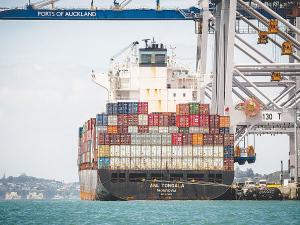Ravensdown partners with Footrot Flats to celebrate Kiwi farming heritage
Ravensdown has announced a collaboration with Kiwi icon, Footrot Flats in an effort to bring humour, heart, and connection to the forefront of the farming sector.
 Shipping disruption caused by Houthi rebels in the Red Sea has so far not impacted fertiliser prices or supply on farm.
Shipping disruption caused by Houthi rebels in the Red Sea has so far not impacted fertiliser prices or supply on farm.
Shipping disruption caused by Houthi rebels in the Red Sea has so far not impacted fertiliser prices or supply on farm.
While both major fertiliser co-operatives, Ballance Agri Nutrients and Ravensdown have enough fertiliser on hand to meet demand, an escalation of the conflict through Middle East may however change things.
The first ship to be sunk by the rebels since the conflict started is the MV Rubymar, which was carrying 21,000 tonnes of ammonium phosphate sulphate fertiliser.
Ballance head of customer Jason Minkhorst told Rural News that while the sinking of MV Rubymar didn’t directly impact its supply chain, it’s indeed a tragic event.
“The only products that Ballance sources to be impacted by these attacks is NPK (nitrogen, phosphorous and potassium), which we source from Europe and can come through the impacted shipping lanes.
“These shipments will take a longer route to avoid the area resulting in a freight increase, but these costs have not been passed on to our customers.”
Minkhorst says the current geopolitical environment and extreme weather events continues to cause instability in fertiliser prices – including the conflict in the Ukraine, tensions in the South China Sea and other parts of the Middle East that are vital to fertiliser production.
“At Ballance, we have a diversified supply chain that allows us to mitigate these disruptions when it occurs. Having local manufacture of nitrogen and phosphate also helps provide supply security.
“Lower incomes, higher interest rates and increased operating costs are driving demand on-farm. However, we are currently seeing fertiliser prices below what they have been at recent peaks, which is good news for farmers,” he says.
Ravensdown, which doesn’t use the Red Sea and Suez Cana route to bring in fertiliser, says the ongoing dispute has impacted vessel rates.
However, so far, there has been little impact on fertiliser supply and availability, according to chief operating officer Mike Whitty.
“The Red Sea situation remains a risk and, like other importers, we are monitoring the situation carefully,” Whitty told Rural News.
He points out that fertiliser prices have largely been unaffected, as the market is influenced by seasonal demand and supply factors.
“From a bulk shipping perspective, we do not use the Suez Canal and Red Sea route.
“However, recent missile attacks combined with the drought in the Panama Canal have contributed to longer shipping routes, decreased capacity and increased demand globally, which means more shipping days are required.
“This has contributed to a firming of vessel rates.”
Whitty warns that any escalation will continue to put pressure on the timing and availability of shipping, with containers particularly likely to be impacted.
Pāmu has welcomed ten new apprentices into its 2026 intake, marking the second year of a scheme designed to equip the next generation of farmers with the skills, knowledge, and experience needed for a thriving career in agriculture.
One team with 43 head, including a contingent from Mid Canterbury, are reflecting on a stellar NZ DairyEvent.
Fonterra farmer shareholders have approved the mechanism for a $2/share capital return expected from the sale of its global consumer and associated businesses.
Trainees in the horticulture industry studying towards a certificate or diploma can now apply for Horticulture New Zealand's (HortNZ) 2026 Industry Training Scholarships programme.
OPINION: The first three Global Dairy Trade (GDT) auctions have been a morale booster for farmers.
Former Fonterra executive Alex Turnbull has been appointed CEO to lead all five Yili Oceania Business Division companies in New Zealand.